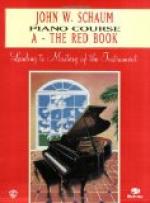“Most emphatically. Finger action is an absolute essential in playing the piano. We must have finger development. As you say, we can never make the fingers equal in themselves; we might practise five hundred years without rendering the fourth finger as strong as the thumb. Rather let us learn to so adjust the weight and pressure of each finger, that all will sound equal, whenever we wish them to do so. I tell my pupils that in regard to strength, their fingers are in this relation to each other,” and the pianist drew with her pencil four little upright lines on the paper, representing the relative natural weight of the four fingers. “The fifth finger,” she said, “figures very little in scale or passage playing. By correct methods of study the pupil learns to lighten the pressure of the stronger fingers and proportionately increase the weight of the weaker fingers.”
(4) Do you approve of technic practise outside of pieces?
“I certainly do. The amount of time given to technic study varies with the pupil’s stage of advancement. In the beginning, the whole four hours must be devoted to technic practise. When some degree of facility and control have been attained, the amount may be cut down to two hours. Later one hour is sufficient, and when one is far advanced a very short time will suffice to put the hand in trim; some rapid, brilliant arpeggios, or an etude with much finger work may be all that is necessary.
“The player gains constantly in strength and technical control while studying pieces, provided correct methods are pursued. Every piece is first of all a study in technic. The foundation must be rightly laid; the principles can then be applied to etude and piece.”
(5) What do you consider the most vital technical points?
“That is a difficult question, involving everything about piano playing. There are the scales of all kinds, in single and double notes. Arpeggios are of great importance, because, in one form or another, they constantly occur. Octaves, chords, pedaling, and so on.”
“The trill, too,” I suggested.
“Yes, the trill; but, after all, the trill is a somewhat individual matter. Some players seem to have it naturally, or have very little trouble with it; others always have more or less difficulty. They do not seem able to play a rapid, even trill. Many are unable to finish it off deftly and artistically. They can trill for a certain number of repetitions; when they become accustomed to the monotonous repetition it is not so easy to go into the ending without a break.”
(6) What means do you advise to secure velocity?




